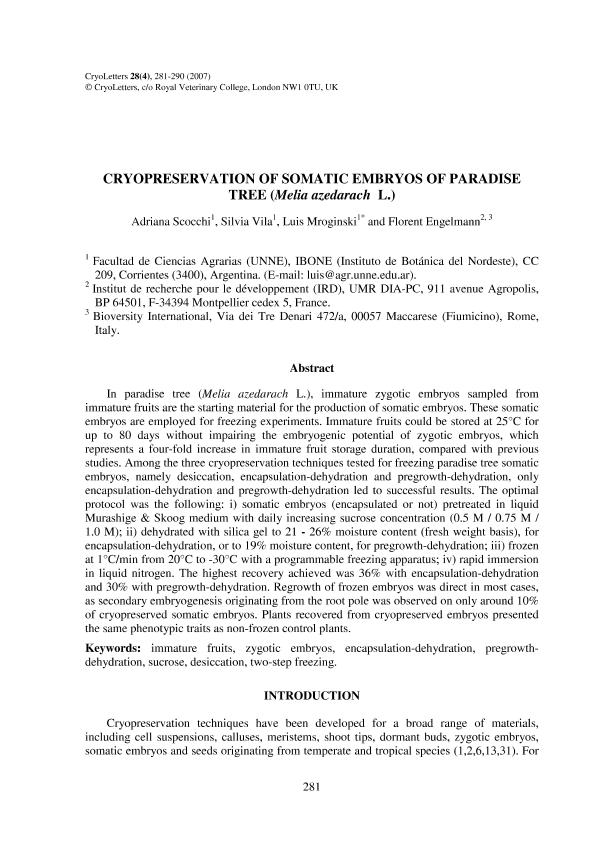Artículo
Cryopreservation of somatic embryos of paradise tree (Melia azedarach L.)
Fecha de publicación:
07/2007
Editorial:
Cryo Letters
Revista:
Cryo Letters
ISSN:
0143-2044
e-ISSN:
1742-0644
Idioma:
Inglés
Tipo de recurso:
Artículo publicado
Clasificación temática:
Resumen
In paradise tree (Melia azedarach L.), immature zygotic embryos sampled from immature fruits are the starting material for the production of somatic embryos. These somatic embryos are employed for freezing experiments. Immature fruits could be stored at 25°C for up to 80 days without impairing the embryogenic potential of zygotic embryos, which represents a four-fold increase in immature fruit storage duration, compared with previous studies. Among the three cryopreservation techniques tested for freezing paradise tree somatic embryos, namely desiccation, encapsulation-dehydration and pregrowth-dehydration, only encapsulation-dehydration and pregrowth-dehydration led to successful results. The optimal protocol was the following: i) somatic embryos (encapsulated or not) pretreated in liquid Murashige & Skoog medium with daily increasing sucrose concentration (0.5 M / 0.75 M / 1.0 M); ii) dehydrated with silica gel to 21 - 26% moisture content (fresh weight basis), for encapsulation-dehydration, or to 19% moisture content, for pregrowth-dehydration; iii) frozen at 1°C/min from 20°C to -30°C with a programmable freezing apparatus; iv) rapid immersion in liquid nitrogen. The highest recovery achieved was 36% with encapsulation-dehydration and 30% with pregrowth-dehydration. Regrowth of frozen embryos was direct in most cases, as secondary embryogenesis originating from the root pole was observed on only around 10% of cryopreserved somatic embryos. Plants recovered from cryopreserved embryos presented the same phenotypic traits as non-frozen control plants.
Archivos asociados
Licencia
Identificadores
Colecciones
Articulos(CCT - NORDESTE)
Articulos de CTRO.CIENTIFICO TECNOL.CONICET - NORDESTE
Articulos de CTRO.CIENTIFICO TECNOL.CONICET - NORDESTE
Citación
Scocchi, Adriana; Vila, Silvia Karina; Mroginski, Luis Amado; Engelmann, Florent; Cryopreservation of somatic embryos of paradise tree (Melia azedarach L.); Cryo Letters; Cryo Letters; 28; 4; 7-2007; 281-290
Compartir




